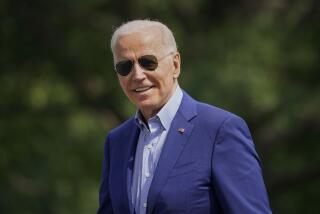Key Senators Voice Fears Over Plans for Tax Overhaul : They See Adverse Effects on Business Investment but Concede That a Bill Will Pass
- Share via
WASHINGTON — Members of the Senate Finance Committee, hearing from three economists that tax revision would depress business investment, expressed strong fears Wednesday about the economic impact of the House-passed tax overhaul bill.
Although their comments raised fresh doubts about whether the committee can reach agreement, Chairman Bob Packwood (R-Ore.) continued to assure reporters that the committee will easily approve a bill acceptable to President Reagan.
And Sen. Russell B. Long of Louisiana, the senior Democrat on the panel and an opponent of the House-approved measure, conceded: “The President wants a tax bill, and I guess he’s going to get a bill before it is all over with.”
Fears for Industry
As the committee opened a series of hearings on tax overhaul, most members expressed concern that the House bill would undermine the international competitiveness of U.S. industry. They challenged Reagan’s goals of dramatically reducing tax rates and shifting some of the income tax burden away from individuals to corporations.
The Finance Committee is expected to begin drafting its own tax bill in early March. Changing the House bill to satisfy the wishes of Reagan and Senate tax writers could cost the government as much as $130 billion in revenue over five years, according to Administration officials.
Top Tax Rate of 35%
The White House wants the Republican-controlled Senate to approve a top individual tax rate no higher than 35%, provide a boost in the personal exemption from $1,080 to $2,000 for most taxpayers and retain some business tax advantages killed by the Democratic House.
Under the House bill, the top rate on high-income taxpayers would be 38%. Taxpayers who itemize deductions would be entitled to a $1,500 personal exemption, although the majority of taxpayers--those who take the standard deduction--would receive a $2,000 personal exemption for themselves and family members.
Some committee members have expressed an interest in meeting Reagan’s requirements and in preserving additional investment tax incentives by introducing a consumption tax, such as an oil tax or a national sales tax. The committee scheduled hearings in late February on proposals for oil import fees.
The economists who appeared before the committee generally supported a consumption tax. But earlier this week, Bill Diefenderfer, the committee’s chief of staff, told reporters that the committee would not “venture out in a new tax area--any new tax area”--without Reagan’s explicit approval.
Although the economists who testified differed somewhat over the specific effects of tax revision, they generally agreed that cutting taxes for individuals by raising taxes on business would retard capital investment while boosting consumer spending.
Effect on Economy
“If enacted in one fell swoop,” a tax plan along the lines of either the House bill or Reagan’s original tax proposal “could have a severely depressing effect on the economy,” said Lawrence Chimerine of Chase Econometrics, a forecasting firm based in Bala-Cynwyd, Pa. After a few years, however, business would adapt to tax changes, leaving the economy no worse off than if the tax code remained unchanged, he added.
“What you’re telling us is that after 15 or 16 years this legislation wouldn’t be all that bad?” Sen. Lloyd Bentsen (D-Tex.) asked rhetorically. “Well, I’m concerned about those 15 or 16 years.”
While most members of the committee agreed with the economists’ criticisms of tax revision plans, a few challenged the reliability of their predictions.
Sen. George J. Mitchell (D-Me.) pointed out that Wharton Econometric Forecasting--one of the firms represented at Wednesday’s hearing--had predicted in 1981 that enactment of Reagan’s tax cut would slash the federal deficit and dramatically boost personal savings, a forecast that proved to be wildly inaccurate.
“Our analysis was as accurate as the Administration’s,” said George Schink, a vice president at Philadelphia-based Wharton.
“That’s not saying much,” Mitchell replied.
More to Read
Get the L.A. Times Politics newsletter
Deeply reported insights into legislation, politics and policy from Sacramento, Washington and beyond. In your inbox twice per week.
You may occasionally receive promotional content from the Los Angeles Times.










